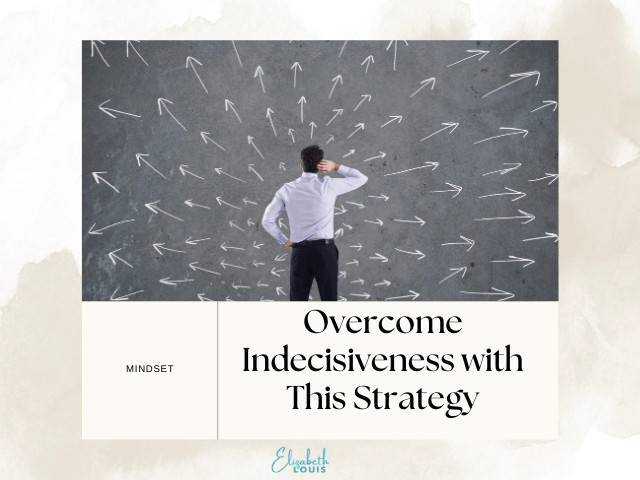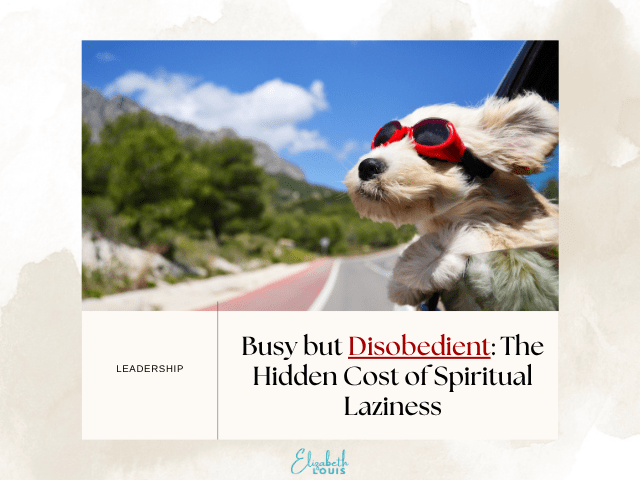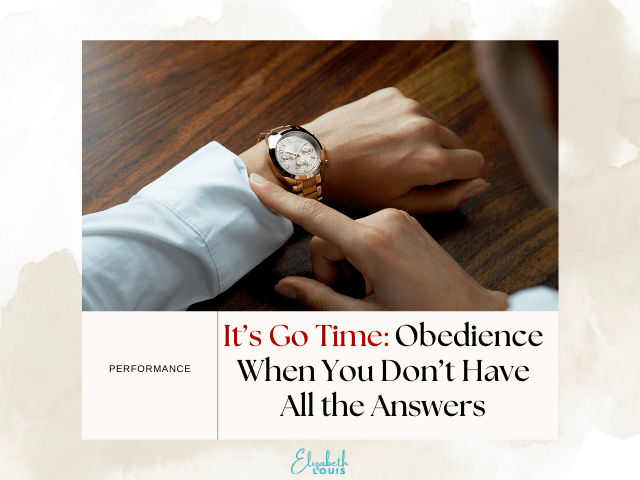
By: Elizabeth Louis
Do you have a hard time making a decision? Are you someone who often feels overwhelmed by the decision-making process? Do you find yourself constantly second-guessing yourself and worrying about missing out on better opportunities?
Is there this chatter in the back of your head that says, “Yeah, but what if something better comes along tomorrow? What if you choose today, but tomorrow the absolute perfect thing comes along?”
If so, you’re not alone. I hear this frustration quite a bit from my high-performer clients. Fear of making the wrong decision can be a real nuisance.
Many people who struggle with indecision worry that a better opportunity might come along in the future, leaving them feeling uneasy and unsure of what to do in the present.
What do you do?
How can you break this obnoxious cycle and start making a decisive decision that leaves you feeling peaceful, even if you learn later that you could have made a better decision?
Fortunately, there are techniques and strategies that can help you break the cycle of indecisiveness and move forward with confidence. With a bit of practice and some guidance, you can learn how to make decisions that align with your values and goals and feel good about your choices.
#1. Understand the Core Root
In my performance coaching practice, I compare the human mind to a garden. During consultations and coaching sessions, I analyze linguistics, behavior, psychometric results, and emotional health to identify the client’s mental weeds, which are the fixed mindsets. Some examples would be perfectionism, codependency, or a lack mindset; of course, there’s a lot more than those examples.
Expert gardeners and farmers understand how dangerous and destructive weeds can be. One weed can destroy an entire crop. Likewise, weeds tell the farmers and gardeners tremendous information too. Certain weeds grow as a result of the soil missing certain nutrients. Once you restore the soil with those missing nutrients, the weeds will not grow back, and it’s the same for one’s mind. Replenish the mental soil with the correct nutrients, and the weeds or fixed mindsets disappear for good.
This makes sense when you stop and think about it.
Neuroscience has proven that the brain works best by addition and not subtraction, which is why it’s best to upgrade your identity than try to mend destructive behaviors.
What’s the core weed of indecision?
The number one fixed mindset that promotes indecision is what is known as the rejection mindset. Now, it’s important to understand that you will not be conscious of the influence of this fixed mindset until you grow your awareness and understand how this mindset manifests. Since the rejection mindset develops when you are a young child, it can take time and effort to identify its voice of influence.
What is the Rejection Mindset?
I will share a quick recap of the rejection mindset. Make sure to sign up for my newsletter to stay in the know for when the full blog of the Rejection Mindset comes out. Sign up here.
The rejection mindset is a deeply rooted attitude and belief system that whispers in your ear that you are not accepted or acceptable. You’ll hear whispers telling you your value and who you are depends on others liking or not liking you.
Humans are wired for love.
We need love from God, our families, and our friends. When we don’t get agape love but performance love (meaning you get love when you earn it versus it freely being given to you), we feel and experience rejection. Over time this can become an automatic way of thinking that eventually latches on to your identity and how you see yourself – unacceptable and unlikeable. Now, it may not be that blunt of a sensation, but if you start to dig deep in your mental soil and mindfully observe your thoughts, you will start to notice thoughts honoring the theme of being unacceptable start coming out.
The rejection mindset is a subtle mindset usually pulling the strings of other fixed mindsets, such as perfectionism and codependency, to name just two. However, even before the weed of the rejection mindset starts to give way for more weeds or fixed mindsets to develop, two strong manifestations of rejection will usually develop first.
One is a general theme of fear. This fear causes you to hear yourself say (even though it’s not you but the rejection mindset, you will think it’s you), “I can no longer trust anyone. I have been hurt so badly that I cannot hurt again. Therefore, I am too afraid to get close to anyone or commit.” The other manifestation is pride, which sounds like, “I can do it better myself. I don’t need your help or anyone’s help. Everyone has hurt me – I’ll just do it myself.”
Does this sound familiar?
ACTION PLAN: Spend the next week exploring any thoughts that may follow the emotions of fear or sadness. Start to label when fear or pride is coming up inside you and choose mindfully to explore the mental crumbs fear or pride has left behind to see if you can start to uncover where the rejection mindset’s core root resides in your mental garden.
#2. Identify Your Values
You make decisions in one of two ways: with your emotions or values.
Values are like your moral compass. They guide you toward your ideal self.
It’s wise to have 3-5 values. Now, you will have to get in the habit of using your values over your emotions when making decisions.
You will need to practice making decisions with your values by clarifying what your values are.
There are multiple ways you can identify your values. For instance, your current values may not align with your ideal self. Therefore, you must choose values that will help you stay on the path toward transforming into your ideal self.
First, identify your ideal self. Write a list of “I AM” statements in the present tense. Remove all constraints like time, money, and skills. Steal characteristics from your mentors, characters, or people you admire. Also, consider this question: If I could remove all your fear, guilt, hatred, abuse, negative experiences, and painful memories, who would you be?
Once you have your answer, identify the values you need to have to become this person. For instance, do you need to value taking care of your mind? If so, health and wellness may be a value of yours. Or do you need to consider sharpening your skills to become your best? If so, then learning or growth may be a value you need to adopt. Or are you working to humble yourself by unconditionally learning to love and take the inferior position with people? If so, then love, compassion, kindness, or altruism may be a value you need to adopt. Or are you trying to be more optimistic and positive instead of negative and doom and gloom thinking? If so, optimism, hope, or positivity could be a value of yours.
Next, identify how you can manifest these values. For instance, if I’m working to become optimistic, I want to catch myself when participating in negative doom and gloom thinking. I would challenge myself to see the situation positively and hopefully. I’d then practice seeing life that way. Or if I valued my health and being my best, I would intentionally put the alcohol and weed down to be clear-headed and focused for the next day.
ACTION PLAN: Identify your ideal self and values. Make a plan of how you can live those values.
#3. The Most Valuable Tip
This is the most valuable tip I can share to defeat indecision. I’ll warn you that it may sound overly simple, but it can be tough to implement.
Practice acceptance!
In psychology, radical acceptance is the skill of accepting situations and realities as they are without intentionally or unintentionally trying to control the situation to be what is ideal for you. Instead, you take note of the sensations, whether comfortable or uncomfortable, running inside your body, remaining open and willing to experience them. Therefore, to practice acceptance, you have to be willing also.
The more you try to fight the uncomfortable sensations running through your body, the more suffering you will bring upon your life. That is what avoidance does!
The fact is life sometimes sucks, so toughen up, butter cup!
You will experience things you don’t want to experience and make poor decisions at times. However, through reflection, discussion, and growing in maturity and wisdom, you can reduce those poor decisions in time, but it’s doubtful you will forever eradicate them. In life you are always learning!
Within the umbrella of practicing acceptance, yes, you have to practice it. You must accept that your default mode is being indecisive. However, there is hope because the brain is pliable, and with dedication, consistent effort, and practice, you can reduce your indecision and start being decisive with your decision-making. It will require practice.
You need to understand and accept a few things to practice this efficiently.
First, when you are making a decision, you only know what you know during the time of making that decision. If, in two days or four months, you learn more information that you did NOT have when making your decision, it is unfair and foolish of you to give yourself a hard time.
Secondly, trust yourself. If you knew the information you learned after making the decision, wouldn’t you have used that information? Of course, you would have. However, at the time, you didn’t have that information. Realize that you want to make the best decision, but part of life is learning and growing. Therefore, there are times when you will make a decision and wish you had made a different one when you reflect because that reflection contains information you didn’t initially have.
Thirdly, when the guilt gremlin condemns you for making a poor decision, don’t see that voice as part of you but as a mental intruder. Next, tell that guilt gremlin this, I made the best decision I could with the variables I had at the time.
Isn’t that the truth? Most people don’t intentionally want to make a poor decision. Of course, we do because we are flawed. When you sabotage yourself, you can use that as an opportunity to reflect and identify the fixed mindsets you need to remove from your mental garden. Again, this is a win when you stop and think about it.
If you can see decisions like this – filled with optimism and hope – it will be easier to move forward factoring in your learnings for your next decision.
Book a complimentary consultation with me here if you’re reading to take your performance and mindset to the next level. If you do what I tell you, I can guarantee a transformation. I have a 99.6% success rate of getting clients to my goals and have worked with over 550 clients.



